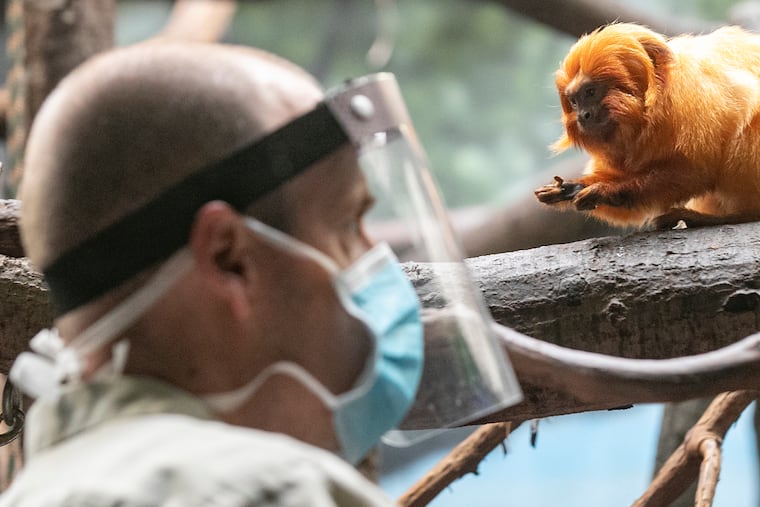Philly Zoo funding helps vaccine effort for monkeys that were once on the verge of extinction
The golden lion tamarin was rebounding from near-extinction in the wild, then the species was devastated by yellow fever.

As humans across the planet are being immunized against COVID-19, a little-known and very different vaccination campaign is underway in the lowland Atlantic Forest of Brazil.
About 60 miles northeast of Rio de Janeiro is the home of the golden lion tamarin, a squirrel-size monkey with a billowy orange mane that was once on the verge of extinction in the wild.
In the early 1970s, it was estimated that only several hundred were still alive in their native habitat. But a decades-long global effort turned the dire situation for the tiny primate into a success story. And the Philadelphia Zoo has played an important role through funding and breeding.
By 2014, the years of work on behalf of golden lion tamarins appeared to have paid off with a then-estimated 3,700 reported in the wild.
But then the monkeys were devastated by an outbreak of yellow fever.
Nearly a third of the still fragile population is believed to have died.
In a race against the viral disease, researchers in Brazil came up with a vaccine. So far, 180 monkeys have been inoculated — though the effort has been hampered by the COVID-19 pandemic. The goal is at least 500, and with only a small group of people doing the work, the vaccinations will take several years.
Andrew J. Baker, the Philadelphia Zoo’s recently retired chief operating officer, had previously spent years studying the monkey. In 2010, the zoo committed $500,000 over 10 years to Associação Mico-Leão-Dourado, which translates as “Golden Lion Tamarin Association.” The small nonprofit in Brazil has been leading the effort to bring its namesake species back from the brink.
The 10-year grant ran its course, but the zoo is continuing to send $50,000 a year to AMLD. Baker said the funding is being renewed on a year-to-year basis.
Luís Paulo Ferraz, executive director of the association, said the financial support from Philadelphia has been “essential,” allowing the nonprofit “to be able to identify the [yellow fever] problem, negotiate with different partners and finally develop, test, and vaccinate the animals.”
When the extinction alarm was sounded for golden lion tamarins, their habitat had shrunk dramatically due to deforestation caused by encroachment from humans, particularly through timber production, cattle ranching, and urban expansion.
The global pet trade dating back centuries also took its toll. Madame de Pompadour, an influential mistress to King Louis XV of France, was known for keeping a golden lion tamarin.
Coordinated conservation efforts led to a remarkable solution: sending captive-bred monkeys back to their ancestral home. From 1984 to 2000, zoos around the world provided 146 golden lion tamarins that were reintroduced to Brazil.
Moreover, the zoos agreed that the Brazilian government would have legal ownership over the primates that remained in captivity. “We’re all just looking out for the good of the species,” said Michael Stern, curator of primates and small mammals at the Philadelphia Zoo.
The monkey’s triumphant resurgence — it is depicted on Brazilian currency as a symbol of the nation’s commitment to conservation — soon came to a halt.
In late 2016, an outbreak of yellow fever, which is transmitted by mosquitoes, occurred in the human population in southeastern Brazil. The first death of a golden lion tamarin from the disease was documented in May 2018. AMLD estimated that more than 1,000 were killed, according to a scientific article published in 2019.
An effective vaccine was available for humans, but none existed for nonhuman primates. So a Brazilian virologist and AMLD board member, Marcos da Silva Freire, helped to develop one. After successful testing and government approvals, AMLD began to vaccinate the wild population in October 2020.
The monkeys are captured, brought back to AMLD’s headquarters to be vaccinated, then returned to the forest.
The goal is to inoculate enough monkeys to establish herd immunity, said James Dietz, a conservation biologist and vice president of Save the Golden Lion Tamarins, a U.S.-based nonprofit that coordinates with AMLD.
Dietz said most of the deaths occurred among preexisting populations located in the best intact forests. Reintroduced monkeys and some that were internally transferred were placed in smaller forest fragments, so it was likely more difficult for the virus to spread.
“It’s safe to say, I believe, that if that work hadn’t been done between 1984 and 2000 — that’s when the reintroductions were done — that we would not have golden lion tamarins in the wild today,” Dietz said.
The species has additional protection with about 500 golden lion tamarins being kept in 150 zoos worldwide that participate in a cooperative breeding program, Dietz said.
The Philadelphia Zoo has two pairs: an older couple named Devra and Jameson, and a younger duo, Pelé and Dorito.
A breeding coordinator recently recommended that Devra, who was born in 2010 at the Santa Ana Zoo in California (Jameson was born the same year in Philadelphia), breed again, said Stern, Philadelphia’s curator of primates and small mammals.
Dorito, a female born in 2013 at the Bronx Zoo, and Pelé, a male born in 2015 at Micke Grove Zoo in California, have had a breeding recommendation for several years, but they have not produced any offspring.
Golden lion tamarins breed easily and Dorito and Pelé don’t have any medical or physical problems and otherwise are friendly with each other.
So maybe it’s just a matter of time, Stern said.
“We’re giving them more of a chance to get to know each other,” he said.